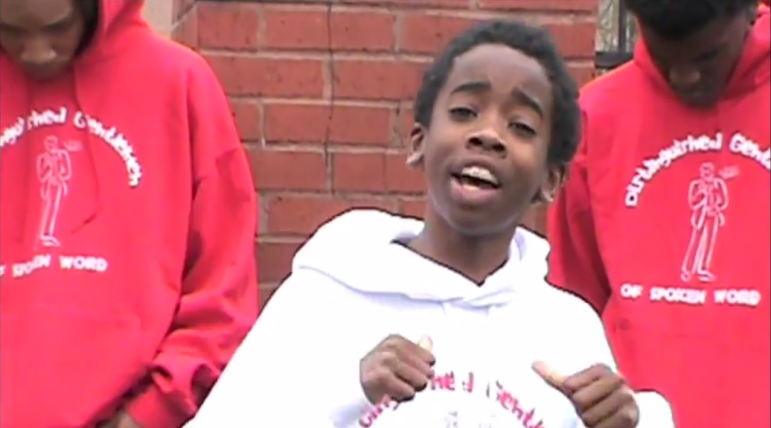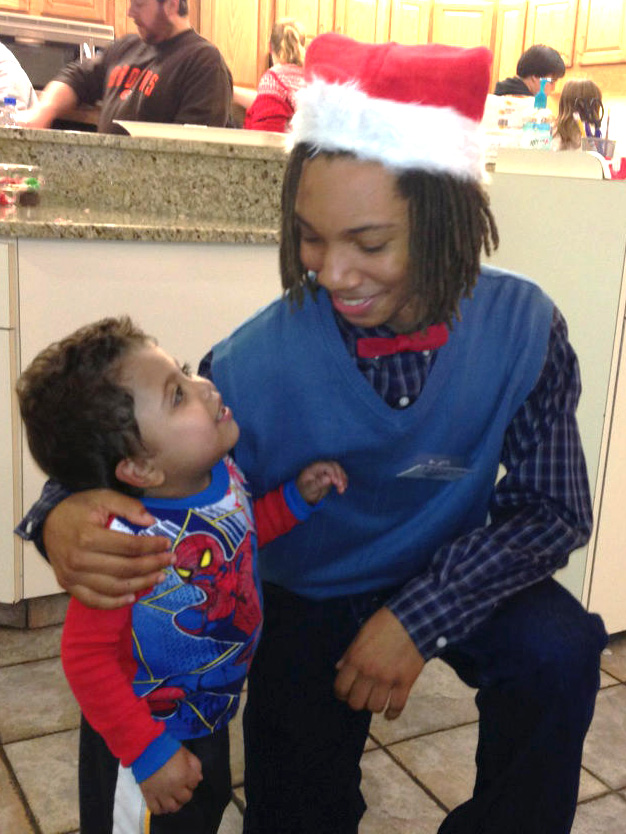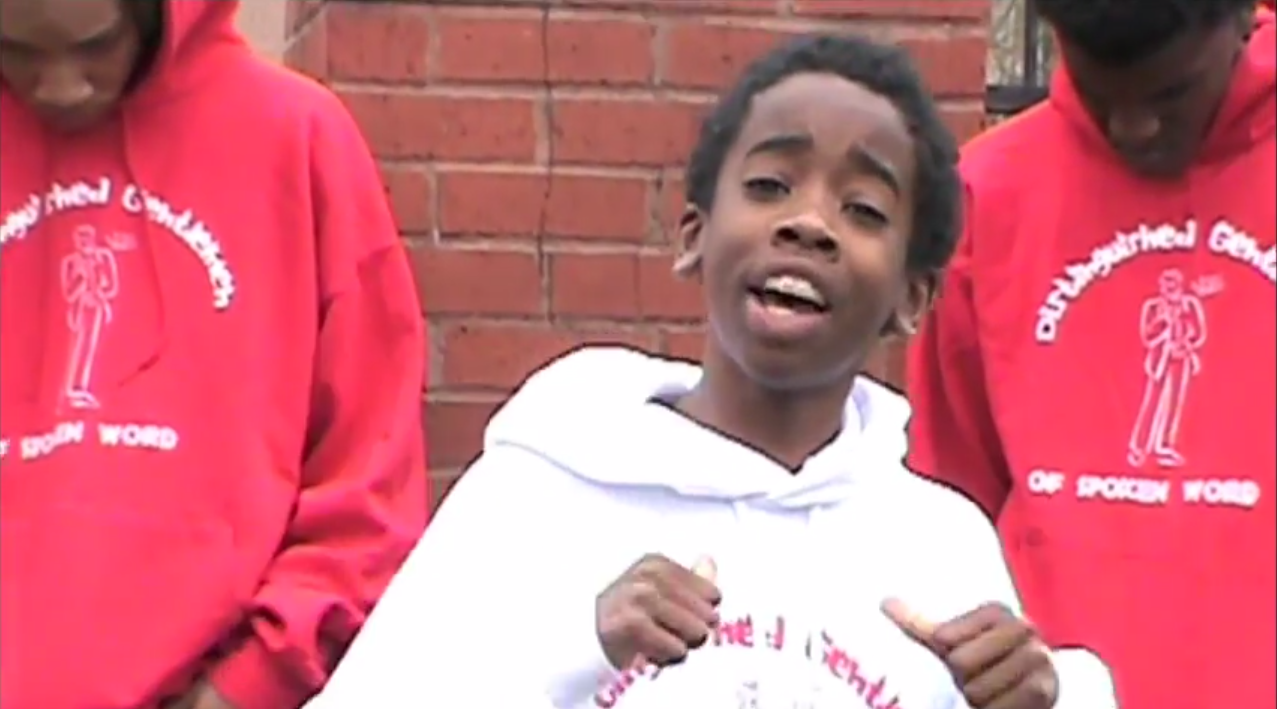
DGSW
The Distinguished Gentlemen of Spoken Word perform in a YouTube video \”Trayvon Martin – Are We Suspects?” from 2012.
High school student Antoine Morris, wearing blue jeans and a plaid shirt, steps forward on the stage.
He speaks out.
“A baby is born! / God’s greatest gift!”
He raises his hands to the sky.
“But the sad part about this story is / she don’t know who the father is.”
He steps back.
“How can she raise a baby on her own / when the girl herself is barely grown?”
He acts out the poem.
“No money, no food, and …”
He beats one hand into the palm of the other with each word:
“She — don’t — have — a — job!”
He keeps the rhythm taut.
“She laid in the bed / shot herself in the head.”
And he builds to the end.
“How did this baby survive? / Well you can look in my eyes / and you’ll see / because the newborn baby is me.”
He points to himself.
Morris is one of 18 young men in the Cleveland group Distinguished Gentlemen of Spoken Word. They perform poetry, including the works of Paul Lawrence Dunbar, Shakespeare, Langston Hughes and Countee Cullen. They also write their own pieces.
They put on a high-energy show — the whole group, dressed identically, beats out a rhythm. They speak in unison, they speak in turn. They perform in churches, nursing homes and in large venues, opening for people like Bernice King and Bill Cosby.
But the goal of the group is not merely performance. It’s to enable these residents of one of Cleveland’s poorest and highest-crime neighborhoods to take charge of their lives, express themselves and develop important life skills.
Jaleel Pegues joined the Distinguished Gentlemen when he was in the 11th grade at SuccessTech Academy in Cleveland.
Members of the group learn to speak on their feet, he said. They develop a strong brotherhood.
Pegues grew up around a lot of gang activity, he said. In Distinguished Gentlemen he found a home.
“I just needed a group of guys who were … as positive as I was and loved being in the arts,” he said.
Spoken word
Founded by Honey Bell-Bey — known to the group as Ms. Honey — the Distinguished Gentlemen meets two afternoons a week and all day Saturday.
In addition to practicing performances, they get tutoring and life skills training, Bell-Bey said. And they write poetry.
“It’s in them already,” she said. “We slowly begin to collect our stories.”
The process of self-expression through poetry includes examining the pain in one’s life. Bell-Bey pushes her group to avoid the “crutches” people often rely on, such as drugs or alcohol.
She grew up in the local Hough neighborhood, remembered nationally for a six-day race riot in 1966. She went on to Bethune-Cookman College in Daytona, Fla., where she studied broadcasting. She worked for NBC, CNN and the Atlanta Committee for the Olympic Games.
She self-published a book, “From Darkness to Light: Overcoming Emotions That Hinder,” and she wrote poetry.
“I was writing about all the social ills in the community,” she said.
Bell-Bey wanted to create a program for African-American boys that would keep them safe and supported after school. She used both the creative arts and prevention strategies developed for youth work.
She became a youth leader for the nonprofit Urban Minority Alcoholism and Drug Abuse Outreach Program in Cleveland (UMADOAP). Distinguished Gentlemen is one of the youth programs sponsored by the organization.
UMADAOP has two approaches in its work with youth: culture-based and performance-based. Programs are designed from research but also traditional wisdom from African-American culture.
Strong cultural identification has been shown to make youth less vulnerable to risky behavior such as drug use, according to UMADAOP.
Evidence also supports the use of arts as a way to strengthen young people.
Spoken word has a strong place in African-American culture, the site says. It’s been used to “remember, celebrate and protest,” the website says.
Seeing a wide world and speaking to it
Avery Swanson, now 25, joined the Distinguished Gentlemen when he was in the 10th grade at Jane Addams Business Career Center.
Bell-Bey told him he would have to write poetry, something he had never done.
“She said, ‘Just write what is on your mind,’” Swanson recalled. Some of the pieces he created dealt with the theme of struggling and overcoming.
“No matter how rough your situation is … you can come out of it,” he said.

DGSW
The Distinguished Gentlemen of Spoken Word also participate in community work.
He had many new experiences with the organization, like going camping, traveling to Florida, performing on stage.
“Some of the kids only know what is in their environment,“ he said. The Distinguished Gentlemen “opens their minds.”
The group also does community service, volunteering at nursing homes and a local Ronald McDonald house. Bell-Bey said the boys see other people facing tragedy in doing the volunteer work — “so we don’t look at poverty or single-parent homes as the worst it can be,” she told Cleveland.com.
In 2012 after Trayvon Martin was killed, the group had discussions about his death, Swanson said.
“They were mad about the situation and decided to do something about it,” he said. They raised money to put up a billboard at East 74th Street and Cedar Avenue in Cleveland. It showed a picture of the Distinguished Gentlemen in hoodies.
The words on the billboard were: “Am I a Suspect Too?”
Swanson went on to a volunteer job as poet-in-residence at the Cleveland Clinic, where he observed the workings of the hospital and write poetry about it.
He currently works as a banquet server at the Ritz-Carlton and two other hotels.
Dontea Gresham, 22, is a junior at Morehouse College in Atlanta. He joined the Distinguished Gentlemen at the end of his ninth-grade year at Martin Luther King Jr. High School Campus for Law and Municipal Careers.
“One of the biggest issues is exposure,” he said. “When you expose a child to different possibilities, that child can dream dreams outside the community.”
Through the Distinguished Gentlemen he saw new places, both in and beyond Cleveland, and he read literature he would not have had in his high school.
“That was the biggest thing to me,” he said.
He described Bell-Bey as passionate about helping others. She believes that you look back and pull someone else up, he said, and she’s done that in her own community.
A political science major, he plans to return to Cleveland and get involved in politics. He has his sights set on the U.S. Senate.
When he was young, Distinguished Gentlemen was his sanctuary. It was a place he could retreat to when the going got tough. To this day, when he is discouraged, he thinks back to the group and to Bell-Bey’s words of encouragement.
The youth program celebrates its 12th anniversary Sunday with a free performance at the Cleveland Museum of Art. It’s also a thank you to the people of Cleveland for helping them raise funds to travel to France. The group leaves May 31 for Paris and Lyon at the invitation of French visitors who came to Cleveland last year.
Violence continues
On April 17, the group performed at an awards banquets for the Cleveland-Marshall College of Law’s Black Law Students Association.
One of the Distinguished Gentlemen, 12-year-old Amir Wilson, stood on stage with his face bruised and swollen.
He had been beaten up a few days earlier by a teenage gang, both male and female.
The older members were upset that they had not been with Amir that evening to prevent the attack.
“It hit us very hard,” Pegues said.
Talibah Wilson, Amir’s mother, told the newspaper the Cleveland Plain Dealer she was worried about the effect of the attack. Would it change her son’s determination to do what was right?
“The streets start to attack them and they feel like they need to have some type of weapon to protect themselves, or that they have to join a gang for protection. This is our reality. This is where we live,” she said.
Amir draws strength from performing, which makes him feel proud, he said. And he draws strength from his fellow members of Distinguished Gentlemen.
“I know I’m still OK. And I’m surrounded by my brothers,” he told the Plain Dealer.


























